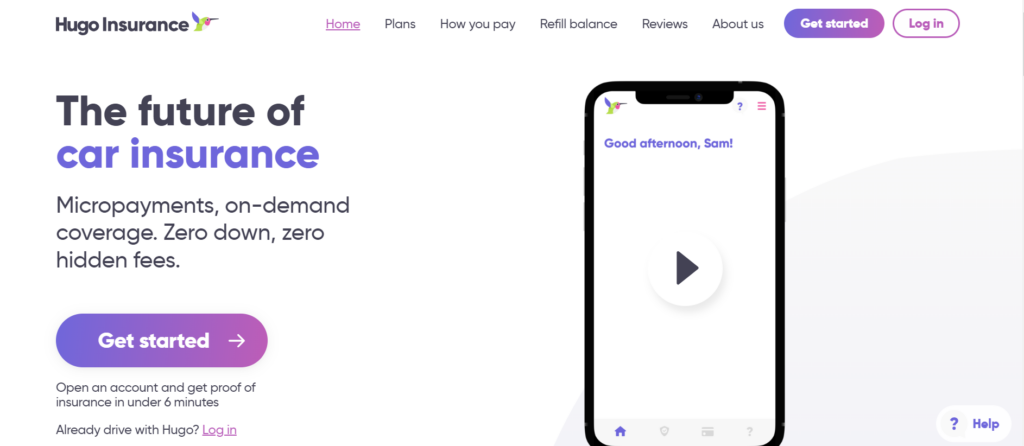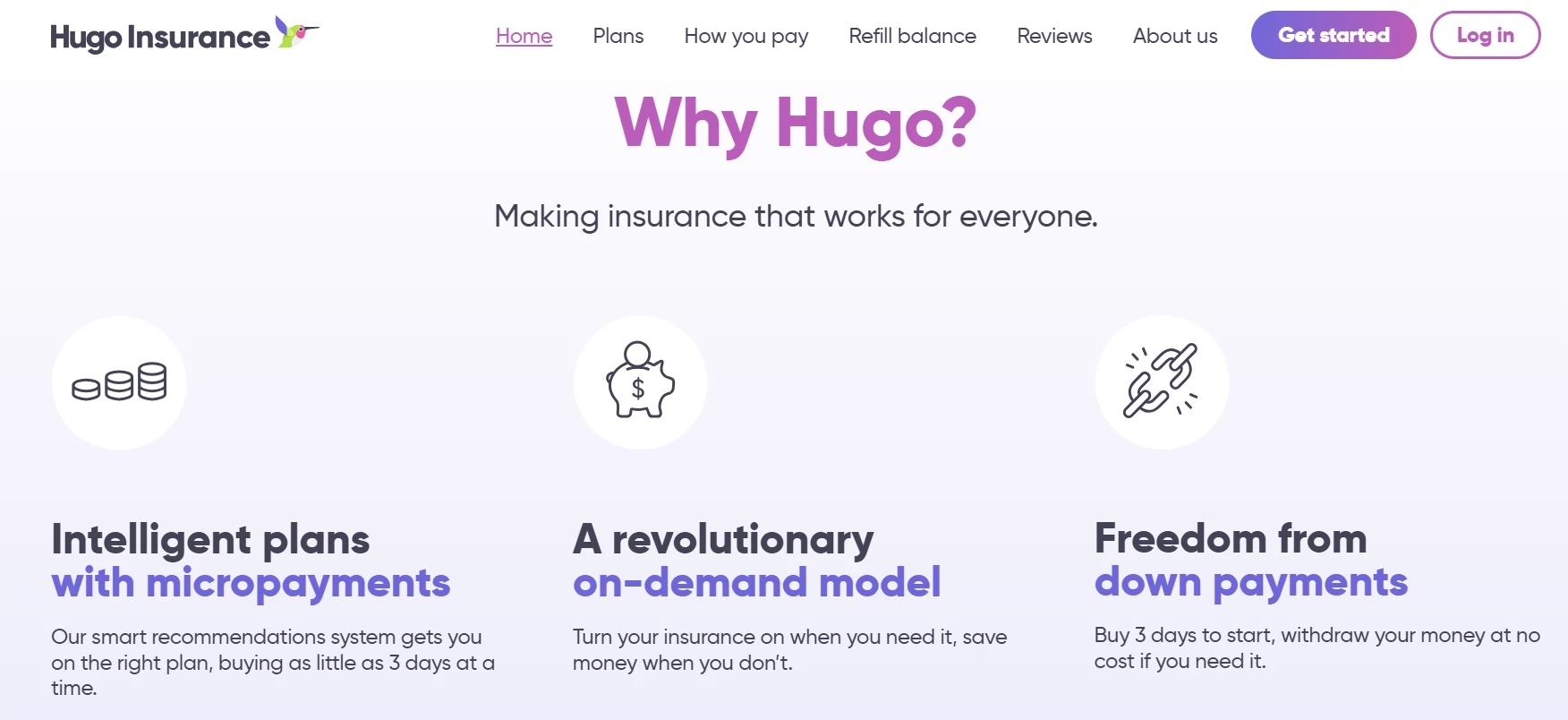Hugo is an actual company that provides car insurance. They give insurance that you can get whenever you need it, but they have more rules and might not be suitable for all drivers.
- Introduction to Hugo Insurance
- What kind of car insurance does Hugo offer?
- Pricing of Hugo Insurance
- How does Hugo Insurance work?
- Pros and Cons of Hugo Insurance
- Get customer support for Hugo Insurance
- How to cancel Hugo Insurance
- Should I Buy Hugo Insurance?
- People Also Ask
- What is Hugo Insurance?
- How does Hugo’s coverage work?
- Can I manage my policy online?
- What is unique about Hugo?
Introduction to Hugo Insurance
Hugo Insurance is a real company that sells car insurance. They started in 2020 in Illinois and now they are in 12 other states. They say they are the first in the world to offer insurance that you can get quickly, even in less than 6 minutes.

Their advertisements talk about being low-cost and how you can get insurance fast without the usual long process. You can get just enough insurance for a few days and pay for it every few days, every week, twice a month, or every month.
This is different from other insurance companies that usually ask for more money upfront if you want to pay monthly. They might also ask you to pay for the whole policy at once, but sometimes you get a discount for that.
Hugo Insurance is known for their unique way of selling insurance. With them, you can choose when to have your insurance active and only pay for the times you’re actually using it.
What kind of car insurance does Hugo offer?
Hugo Insurance sells car insurance in 13 states with three different plans: Flex, Unlimited Basic, and Unlimited Full.
All plans cover you if you are at fault in an accident, let you make small payments without big upfront costs, and protect you from bank fees if you do not have enough money in your account. The Unlimited Full plan also pays for damage to your car from accidents, bad weather, or animals. The Flex plan is special because you can turn your insurance on or off whenever you want without extra cost.
Hugo mostly offers one plan per state. In California and Illinois, you can get the Flex plan. In Illinois, you can also get the Unlimited Full plan. In Arizona, Texas, Indiana, Ohio, Pennsylvania, Tennessee, Mississippi, Alabama, Georgia, South Carolina, and Florida, you can only get the Unlimited Basic plan.
Hugo Insurance works online and sells directly to you. You do not need to call or talk to agents. If you live in a state where they sell insurance, you can sign up and buy a policy on their website.
Once you have Hugo insurance, you can do everything online. You can pay, change your coverage, and get your insurance card. They will not send you a paper card, but you can print one if you need it.
Pricing of Hugo Insurance
Hugo Insurance offers competitive pricing for their car insurance policies, especially appealing for those seeking short-term coverage. Here’s a summary of their pricing:
- Liability Only: The average cost for a basic liability-only policy is $48 per month.
- Full Coverage: A full-coverage policy averages $54 per month.
- Cost-Effective: Both options are significantly less than the national average rates.
- Pay-As-You-Go: Hugo also provides a pay-as-you-go option, charging only for the days you drive.
How does Hugo Insurance work?
Add your details: Hugo’s website says you can make an account and pick your insurance in 2 minutes or less. Their form is simple and asks for things like your driver’s license number, address, and car details (like the make, model, year, and VIN). They also ask for your social security number (SSN) but it is not required. If you give your SSN, you might get cheaper rates.
Choose your insurance: Hugo Insurance does not have as many choices as other companies. They focus on the basic insurance that your state says you need, and only in Illinois do they offer full coverage for things like accidents or bad weather. Hugo has different options in some places, but not as many as usual, which means you cannot get as much protection or lower prices by choosing to pay more upfront.
Pay for your insurance: People in Illinois or California can pick from 2-3 Hugo plans, which changes the price. In other states, there is only one plan, and you pay what Hugo asks. You can pay every three days, every week, every two weeks, every month, or every six months. Hugo puts your money in your account and takes a little out each day.
You can add more money yourself or set it up to add money automatically. If you do not use all your money, you can take it back and put it in again later. If you run out of money, you can stop your insurance until you add more.
Turn your insurance on and off: Hugo’s special feature is that you can choose when to have insurance. However, it is a bit tricky. Only in California and Illinois, if you have the Flex plan, can you turn your insurance on and off without the price changing. Hugo suggests using your insurance at least once a week because if you do not, the DMV might suspend your car’s registration.
For the Basic Unlimited Plans, you are supposed to keep your insurance going. If you stop it and do not have another policy, Hugo tells the DMV right away. They keep your price the same for three days, but then they might charge you extra to start again. If you wait ten days, your price could go up a lot. Also, if you stop your insurance, it could make it harder to get insurance somewhere else later.
Related Articles
- Must-Read Digital Security Books for Beginners
- How LEI Register Services Ensure Smooth and Efficient LEI Registration
- Payday Loans Eloanwarehouse
- Openhouseperth.net Insurance: Reviews, Legitimacy, Pros, Cons, and More
- How Much Does DoorDash Pay An Hour
- How to Make $500 A Week With DoorDash in 2024
- Otto vs Coverage Cat
Pros and Cons of Hugo Insurance
| Pros | Cons |
|---|---|
| Flexible Coverage: Offers customizable policies that can range from a single day up to several months. | Limited Long-Term Options: Not suitable for those seeking traditional, long-term car insurance policies. |
| Digital-First Approach: The entire process from quote to coverage can be handled through Hugo’s app or website. | Limited Availability: Coverage is not available in all states. |
| Immediate Coverage: Provides instant proof of insurance through their digital platform. | Coverage Depth: May not offer the same level of coverage depth as traditional insurers. |
| Competitive Pricing: Offers competitive rates for short-term insurance needs. | Potential Higher Costs: Frequent, short-term policy users may incur higher overall costs. |
| Accessible Customer Support: Despite being a digital-first company, Hugo provides accessible customer support. | DMV Notices: Some customers reported receiving DMV notices of inactive insurance. |
| Micropayments: Allows customers to make small payments without large down payments. | Customer Service: Some users found it difficult to contact customer service. |
| On-Demand Model: Flex plan allows drivers to turn their insurance on and off. |
Get customer support for Hugo Insurance
Getting help on Hugo Insurance’s website might be a bit difficult because they usually guide you to use your online account or chat for support. However, if you need to talk to someone at Hugo right away, or if you need to stop your insurance, you can reach out to them by:
- Phone: Call their help team at (515) 303-2410.
- Email: Send an email to their help team at support@withhugo.com.
How to cancel Hugo Insurance
If you want to stop your Hugo Insurance, here is what you should do in simple steps:
- Sign in to your Hugo account.
- Stop your insurance. Go to the ‘My Policy’ section and switch your insurance to ‘OFF’.
- Get your money back. Click on ‘Payment’, then ‘Balance History’. Press ‘Withdraw’ and type in how much money you want back.
- If you want to remove your Hugo account for good, you need to call their Customer Support at (515) 303-2410.
Should I Buy Hugo Insurance?
Hugo Insurance is a real car insurance provider with actual policies. It is a good choice for people who want to save money and only need to use their car occasionally, or who prefer to make small payments more often.
If Hugo Insurance is available where you live and you are looking for a basic policy that covers just what is necessary, and you like the idea of making small payments, then Hugo could work well for you.
However, Hugo is not the best option for people who need full coverage for their car, like protection for accidents or bad weather, unless they live in Illinois. It is also not great for people who do not want to keep checking and changing their insurance.
You can pay ahead for longer insurance coverage, but with Hugo, you will need to stay on top of your insurance and payments, especially if you want to save money by turning your insurance on only when you need it.
Also, if you have a lot of money or valuable things, Hugo might not be the best because their coverage is limited, and you could risk losing a lot if you get into a serious accident.
People Also Ask
What is Hugo Insurance?
Hugo Insurance is a car insurance company that started in 20202. It is known for on-demand liability coverage and operates in 13 states.
How does Hugo’s coverage work?
Hugo offers three plans: Flex, Unlimited Basic, and Unlimited Full4. Flex allows you to turn insurance on and off, while Unlimited Full includes comprehensive and collision coverage.
Can I manage my policy online?
Yes, you can handle everything online, including payments, policy changes, and getting proof of insurance.
What is unique about Hugo?
Hugo’s on-demand model lets you pay only when you use your insurance, especially with the Flex plan. They also offer micropayments without large down payments.















